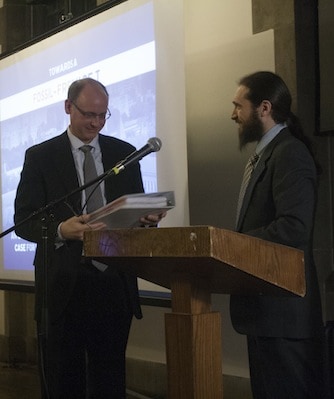U of T president Meric Gertler will soon appoint a Presidential Advisory Committee to determine whether the university should divest its direct stock holdings from fossil fuel companies. This decision follows a campaign by an environmentalist student group called Toronto350. Toronto350 formally presented its extensive divestment brief to university administration on March 6.

Toronto350′s Stuart Basden presenting the proposal to a U of T representative. CAROLYN LEVETT/THE VARSITY
This is the first time the university’s Policy on Social and Political Issues with respect to University Divestment, adopted in 2008, will be put into action. The policy states that, once presented with a convincing brief, the president can appoint an ad hoc committee to examine a social or political divestment issue. After the committee completes its investigation, it will submit a written recommendation to the president, who will then make the final decision.
In its 190-page brief, Toronto350 asks the university to pull all of its direct stock holdings from Royal Dutch Shell within one year, and all of its direct stock holdings from 200 other fossil fuel companies within five years. It also asks the university to stop making new investments in the industry, and immediately declare its intention to divest.
The divestment brief details the evidence for Toronto350’s main claim, which is that the university has an ethical obligation to divest because fossil fuel companies engage in socially injurious business practices. Since its establishment in 2012, Toronto350’s campaign has rallied the support of many prominent student groups, including the University of Toronto Students’ Union (UTSU) and Graduate Students’ Union (GSU).
Though the details of the committee’s membership have yet to be decided, it will be chaired by a senior university officer appointed by the president. The president will recommend the appointment of individuals with relevant expertise for approval by the executive committee of the Governing Council. These individuals may include student representatives, faculty and teaching staff, alumni, and administrative staff.
Gertler said that he expects the committee will seek submissions and feedback from the wider U of T community. The committee will be responsible for setting its own rules and timelines.

